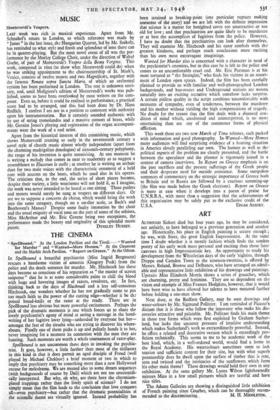MUSIC
Monteverdi's Vespers.
LAST week was rich in musical experience. Apart from Mr. Sclumbers return to London, to which reference was made by " Janus " in the last issue the Hungarian Quartet, led by Mr. Szekely, has reminded us what style and finish and splendour of tone there can be in quartet-playing. But the most novel event of all was the per- formance by the Morley College Choir, under the direction of Waltef Goehr, Of part of Monteverdi's Vespro della Beata Vergine. This work, composed in r6ro (to show what Monteverdi could do) when he was seeking appointment to the choirmastership of St. Mark's, Venice, consists of twelve motets and two Magnificats, together with the famous Sonata sopra Sancta Maria, of which an orchestral version has been performed in London. The rest is unknown terri- tory, and, until Mal.tiero's edition of Monteveidi's works was pub- lished, seems to have been overlooked by most writers on the com- poser. Even so, before it could be realised in performance, a practical' score had to be arranged, and this had been done by Dr. Hans Redlich. I confess I am not in a position to comment with authority upon his instrumentation. But it certainly sounded authentic with its use of string tremolandos and a massive consort of brass, while Mr. Geraint Jones's playing and registration of the organ accompani- ments were the work of a real artist.
Apart from the historical interest of this astonishing music, which shows Monteverdi creating so early in the seventeenth century a novel style of church music almost wholly independent (apart from the charming madrigalian doxologies) of sixteenth-century polyphony, the range of his invention is quite astonishing. At one moment he is writing a melody that comes as near to modernity as to suggest a resemblance to Elucevan le stelle ; at another he is writing an archaic duet for two male voices with the characteristic ornament of a held note with accents on the beats, which he used also in his operas. The criticism that, in the end, the series of short pieces became, despite their variety, a little wearisome will not hold if, as I imagine, the work was never intended to be heard at one sitting. These psalms and motets would surely be sung at vespers on different days. Or are we to suppose a concerto da chiesa, which, would bring the work into the same category, though on a smaller scale, as Bach's and Beethoven's Masses? Despite some faulty intonation by the choir and the usual exiguity of vocal tone on the part of some of the soloists, Miss McArthur and Mr. Eric Greene being two exceptions, the performance made the beauty and originality of this splendid music


























 Previous page
Previous page